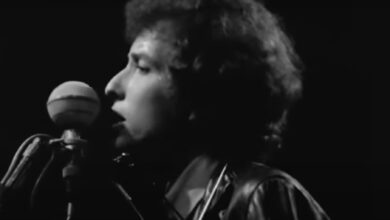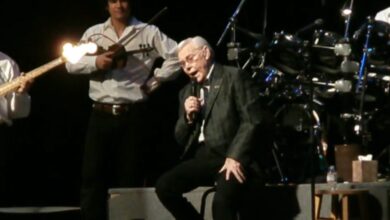The Kinks’ ‘All Day and All of the Night’ Ignites the British Invasion in 1964
In late 1964, The Kinks unleashed All Day and All of the Night, a song that would not only solidify their place in rock history but also push the British Invasion into high gear. With its raw energy, aggressive guitar riffs, and rebellious attitude, the track became one of the most electrifying anthems of its time. It reached No. 2 on the UK Singles Chart and climbed to No. 7 on the Billboard Hot 100 in the United States, cementing The Kinks as one of the most exciting and influential bands of the era.
By the time All Day and All of the Night was released, The Kinks had already made waves with their breakout hit You Really Got Me. Formed in Muswell Hill, London, in the early 1960s by brothers Ray and Dave Davies, the band quickly became known for their gritty, no-frills approach to rock and roll. Unlike many of their contemporaries, who leaned heavily on American blues influences, The Kinks carved out a sound that was distinctly their own—sharp, brash, and unmistakably British. Their music blended R&B grit with an edgy, almost punk-like intensity, setting them apart from other British acts of the time.
The origins of All Day and All of the Night are deeply tied to the band’s early success. Following the massive impact of You Really Got Me, The Kinks’ record label, Pye Records, pushed for a follow-up single that would maintain the band’s momentum. Ray Davies, the band’s primary songwriter, crafted All Day and All of the Night in response. The song built upon the power-chord-driven structure of You Really Got Me but ramped up the intensity, featuring an even more aggressive riff and a relentless forward drive. Some critics at the time noted the similarities between the two songs, but All Day and All of the Night took the signature Kinks sound to another level.
The recording process for the track was fast-paced and almost chaotic, capturing the band’s raw energy. Produced by Shel Talmy, who also worked with The Who and The Easybeats, the song was recorded with a stripped-down, live-in-the-studio approach that emphasized its rawness. Dave Davies’ signature distorted guitar tone—achieved by slashing his amplifier’s speaker cone with a razor blade—gave the song its unmistakable grit. The rhythm section, powered by drummer Mick Avory and bassist Pete Quaife, kept the song’s pulse relentless, while Ray Davies’ sneering vocals injected a rebellious charm that resonated with young audiences.
Upon its release, All Day and All of the Night was met with widespread acclaim. It quickly climbed the charts, proving that The Kinks were not just a one-hit wonder but a formidable force in the rock scene. While some critics initially dismissed it as too similar to You Really Got Me, the song’s infectious energy and undeniable hook made it an instant fan favorite. It was a song that embodied youthful urgency, desire, and a restless need for freedom—elements that defined the rock and roll spirit of the 1960s.
Beyond its chart success, the song played a crucial role in shaping the British Invasion. The Kinks, along with The Beatles, The Rolling Stones, and The Who, helped establish British rock bands as dominant forces in the American music scene. Their aggressive sound and defiant attitude influenced a new wave of musicians, from the early garage rockers of the ‘60s to the punk pioneers of the ‘70s. The song’s influence can be heard in bands like The Ramones, The Clash, and even later in hard rock and heavy metal.
For The Kinks themselves, All Day and All of the Night marked the beginning of a prolific period. The song’s success allowed the band to tour extensively and develop their songwriting further. Ray Davies, always one to push boundaries, soon shifted toward more sophisticated storytelling in his lyrics, leading to the creation of some of the most revered albums of the late ‘60s and early ‘70s, including The Kinks Are the Village Green Preservation Society and Arthur (Or the Decline and Fall of the British Empire).
Over the decades, All Day and All of the Night has been covered and reinterpreted by numerous artists, further solidifying its status as a rock classic. The Stranglers recorded a punk-infused version in 1988, bringing the song back into the charts, while artists such as Scorpions and Quiet Riot have incorporated it into their live performances. Its raw simplicity and rebellious energy make it a song that transcends generations, continuously inspiring new interpretations.
At the time of its release, The Kinks were also navigating internal band tensions and industry challenges. While they had established themselves as hitmakers, their volatile relationship with the press and frequent disputes with promoters led to their temporary ban from touring in the United States in 1965. Despite these challenges, their music continued to resonate globally, proving that their influence extended far beyond their ability to tour.
Even today, All Day and All of the Night remains a defining track in rock history. It frequently appears on lists of the greatest rock songs of all time and continues to receive airplay on classic rock radio stations worldwide. The song captures the essence of The Kinks at their most unfiltered—a band that embraced imperfection, attitude, and raw energy to create something timeless.
Looking back, All Day and All of the Night didn’t just build on the success of You Really Got Me—it cemented The Kinks’ legacy as pioneers of hard-edged, riff-driven rock. Its influence can still be heard in everything from punk rock to modern indie music. It was a song that took the rebellious spirit of the ‘60s and packed it into two minutes of electrifying sound.
While The Kinks would go on to experiment with different styles and themes, All Day and All of the Night remains one of their most enduring and instantly recognizable tracks. It captures the spirit of a band on the rise, eager to make their mark and unwilling to play by anyone’s rules. Decades later, its message remains the same—rock and roll, at its core, is about passion, defiance, and the thrill of the moment.



